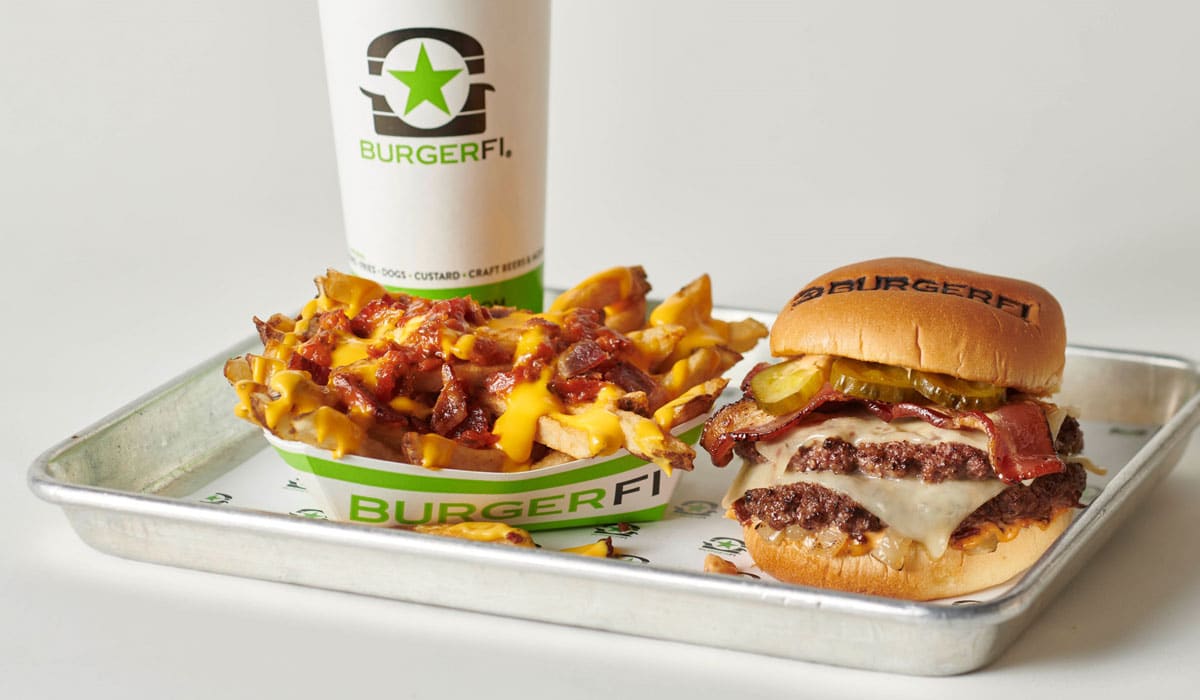The first quarter marked BurgerFi’s first full period as a publicly owned company, and the better-burger chain did not disappoint.
Systemwide same-store sales increased 4 percent compared to 2020. Much of that was driven by digital channels, which earned $13 million, or a 98 percent increase year-over-year. Those 519,000 digital orders translated to a 33 percent mix. Systemwide restaurant sales lifted 19 percent to $39.8 million.
BurgerFi ended Q1 with 117 restaurants — 98 franchised and 19 corporate locations. The chain opened four stores in the quarter and closed six. The plan is to debut 30 restaurants in 2021 and spend approximately $15 million in capital expenditures to primarily support new restaurant construction. Additionally, the company has 21 stores in various stages of development — the most ever at one point in time in brand history. Two drive-thru locations in Hamburg, Kentucky, and Nevada, have opened with the brand currently looking at ways to retrofit stores to expand drive-thru offerings.
“We believe that we’ll be the first to deliver high quality, better-for-you food in a modern drive-thru format at scale,” CEO Julio Ramirez said during the restaurant’s Q1 earnings call.
BURGERFI’S COVID JOURNEY
BurgerFi on Cusp of True Growth Potential
BurgerFi Adds Martha Stewart to Board of Directors
BurgerFi Rides Digital Momentum into 2021
Now Public, BurgerFi Rings the Nasdaq Opening Bell
BurgerFi is Witnessing a Delivery Explosion
Can BurgerFi Become the Next Great Burger Chain?
BurgerFi, QSR’s 2020 Breakout Brand of the Year, announced intentions to merge with OPES Acquisition Corp. almost year ago. The company officially joined Wall Street in mid-December under the ticker symbol “BFI.”
The restaurant’s growth strategy starts in its home state of Florida, where it has more than 50 locations. The chain will then work its way up the Eastern Seaboard and build out established markets in Atlanta, the Carolinas, and the suburbs of Washington, D.C., Philadelphia, and New York. At the same time, the brand wants to pursue multi-unit franchise deals in the Southwest and Midwest, targeting franchise partners that are equipped with the right amount of capital, restaurant experience, geographic knowledge, and cultural awareness.
While that franchise growth proceeds, BurgerFi will build clusters of company-run restaurants in cities with the greatest potential, like Jacksonville, Tampa, Atlanta, and Nashville.
“As we open company-owned restaurants in those regions, we will use them as a base to support our franchisees, leveraging corporate support to provide better training, region-specific marketing while showing that we have skin in the game,” Ramirez said.
The restaurant is also continuing its pursuit of nontraditional outlets through REEF Technology and Epic Kitchens. As of now, BurgerFi has nine ghost kitchens in six states. The goal is to open 15 to 20 by the end of 2021. The game plan is twofold; some ghost kitchens are intended to pierce markets where BurgerFi doesn’t yet have a major presence while others are meant to bolster awareness in existing markets. For example, the company has five stores in Atlanta, but it’s adding REEF ghost kitchens to further drive market share.
Internationally, BurgerFi is looking to open more locations in Puerto Rico and exploring potential partners throughout Latin America. At the beginning of 2021, the brand signed a multi-unit development deal with Food Supplies Co. to open six stores in the Eastern Province of the Kingdom of Saudi Arabia. The first location is scheduled to open in Q4 2021.
“Overall, this is a great time to be at the helm of BurgerFi,” Ramirez said. “We have a great, differentiated strong brand with a menu that our customers crave across the globe. We believe we have the capital and the strong leadership team in place to aggressively pursue our expansion strategy while maintaining the quality and culture that makes our restaurant the best burger experience in the planet.”
Total revenue in Q1 increased 32 percent to $11 million compared to $8.3 million last year. Adjusted EBITDA was $700,000 compared to $1.1 million in the year-ago quarter. The decline was primarily a result of an increase in costs associated with being a public company, along with investments to support future growth initiatives.







